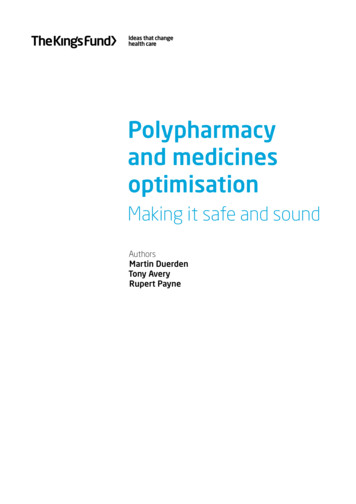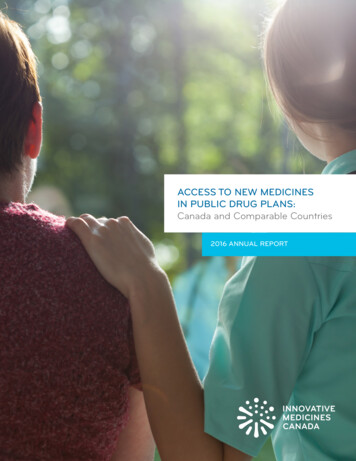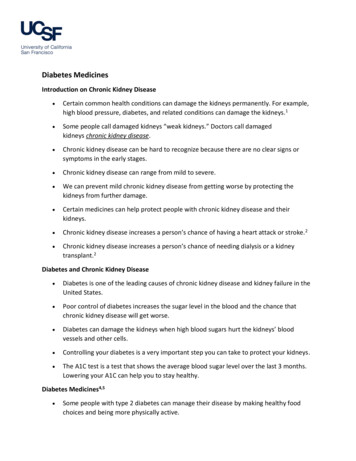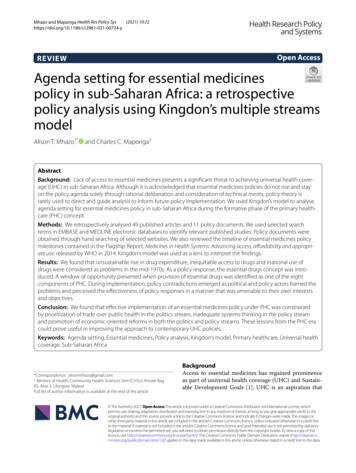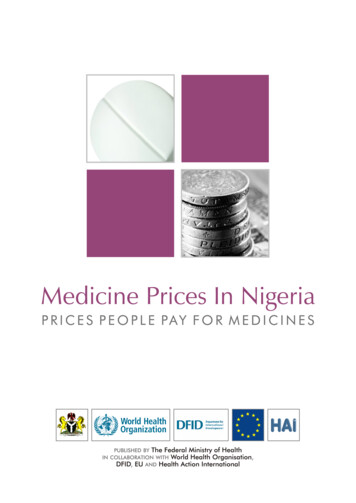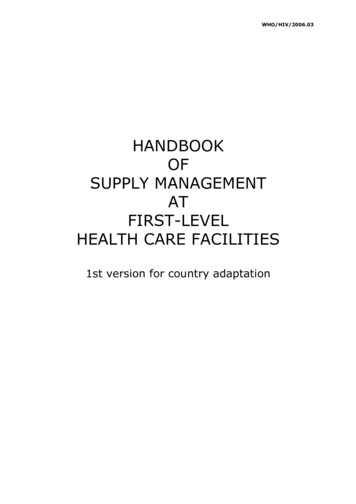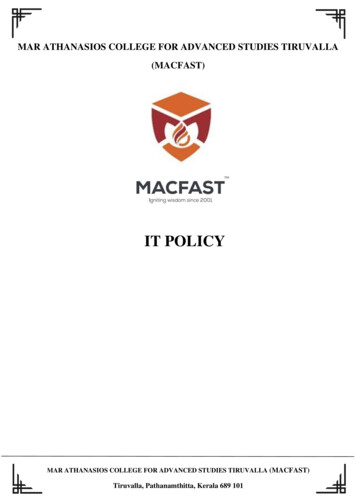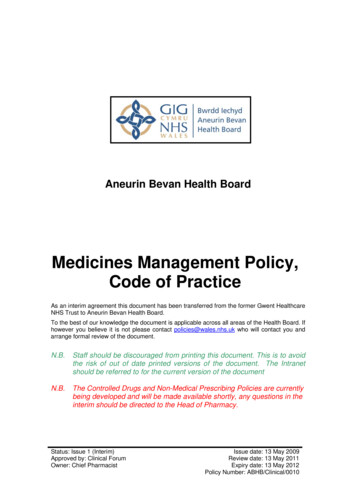
Transcription
Aneurin Bevan Health BoardMedicines Management Policy,Code of PracticeAs an interim agreement this document has been transferred from the former Gwent HealthcareNHS Trust to Aneurin Bevan Health Board.To the best of our knowledge the document is applicable across all areas of the Health Board. Ifhowever you believe it is not please contact policies@wales.nhs.uk who will contact you andarrange formal review of the document.N.B.Staff should be discouraged from printing this document. This is to avoidthe risk of out of date printed versions of the document. The Intranetshould be referred to for the current version of the documentN.B.The Controlled Drugs and Non-Medical Prescribing Policies are currentlybeing developed and will be made available shortly, any questions in theinterim should be directed to the Head of Pharmacy.Status: Issue 1 (Interim)Approved by: Clinical ForumOwner: Chief PharmacistIssue date: 13 May 2009Review date: 13 May 2011Expiry date: 13 May 2012Policy Number: ABHB/Clinical/0010
Aneurin Bevan Health BoardMedicines Management Policy Code of PracticeOwner: Chief PharmacistABHB/Clinical/0010Contents:1GLOSSARY OF TERMS AND ABBREVIATIONS . 72EXECUTIVE SUMMARY. 113POLICY STATEMENT . 114POLICY AIM . 114.14.255.15.26Guidance on Safe and Appropriate Prescribing:. 12Classification of Drugs . 12RESPONSIBILITIES . 13Corporate Responsibilities . 13Operational Responsibilities . 13RISK MANAGEMENT. 167LEGISLATION AND GUIDANCE ON THE CONTROL OFMEDICINES. 168PRESCRIBING . 178.18.28.38.48.5Prescribing Medicinal Products – Who May Prescribe? . 17Prescriptions - Inpatients . 17Discontinuing Medicines/Amendments to Prescriptions . 20Special additional charts. 20Discharge Notification and Prescription Forms . 218.5.1Discharge Prescriptions. 218.5.2Out Patient Prescriptions . 228.5.3Discharge prescriptions transcribed by a pharmacist . 238.5.4Dietetic Products . 248.6Medicinal products issued other than by the pharmacy department . 248.7Prescribers’ Specimen Signature. 248.8Telephoned and Faxed Prescriptions . 258.8.1Prescribing by Telephone – Verbal Prescriptions . 258.9Regular Review of Prescriptions. 258.10The Formulary . 26Status: Issue 1 (Interim)Approved by: Clinical ForumIssue date:13 May 2009Review date:13 May 2011Expiry date: 13 May 2012Page 2
Aneurin Bevan Health BoardMedicines Management Policy Code of PracticeOwner: Chief PharmacistABHB/Clinical/00109PATIENT GROUP DIRECTIONS (PGD) . 2610PATIENT SPECIFIC DIRECTION (PSD) . 2710.111Patient Specific Protocol. 28PHARMACY DEPARTMENTS . 2811.111.211.311.411.511.6Responsibility. 28Security. 28Purchasing of Medicinal (and other) Products . 29Manufacture of Medicinal Products. 30Storage of Medicinal Products within Pharmacy Departments . 30Supply of Medicinal Products . 3111.6.1 Authorities under which a supply may be made:. 3111.6.2 Telephoned and faxed orders . 3211.6.3 Supply records. 3211.7Dispensing quantities to be supplied . 3311.8Labelling of Medicinal Products . 3411.9When pharmacy departments are closed . 3411.10 Ward Clinical Pharmacist Responsibilities. 3511.11 Controlled Stationery . 3512ORDERING STOCK DRUGS AND PHARMACEUTICALS(ACUTE AND COMMUNITY). 3612.112.2Responsibility. 36Stock Medicines. 3712.2.1 Revision of stockholding . 3712.2.2 Ordering stock drugs and pharmaceuticals . 3812.2.3 Top up by Pharmacy Staff. 3812.2.4 Delivery. 3812.2.5 Receipt of Medicines . 3912.2.6 Lending/borrowing medicines . 3912.3Ordering Controlled Drugs. 401313.113.213.313.413.513.613.713.8STORAGE OF MEDICINAL PRODUCTS . 40Stock holding . 40Inspection of drug stocks . 40Medicinal Products . 41Refrigerated Storage . 41Medicine Trolleys. 41Emergency Medicines . 42Patients Own Drugs. 42Unlawful Items – Drugs, etc. 42Status: Issue 1 (Interim)Approved by: Clinical ForumIssue date: 13 May 2009Review date: 13 May 2011Expiry date: 13 May 2012Page 3
Aneurin Bevan Health BoardMedicines Management Policy Code of PracticeOwner: Chief l/0010GENERAL SECURITY . 44Health and Safety . 44Custody of Medicines Cupboard Keys. 44Bed Side Medicine Cabinet Keys. 45GP Out of Hours . 45Drug and Pharmaceutical Samples . 45Action to be taken in the Event of a Stock Discrepancy. 45ADMINISTRATION . 4615.1Nurse Procedure. 4715.2Children and Neonates . 4815.3Emergency Administration. 4815.4Measurement and administration of liquid medicines via oral and otherenteral routes . 4915.5Administration Check-list of Medicines . 4915.6Administration of Controlled Drugs by Nurses . 5015.7Immunisation and Vaccination . 5015.8Administration Against Pharmacist Amended Prescriptions –Clarification of Roles and Responsibilities. 5115.9Administration of Medicines to Patients at Home. 5215.10 Patient Own Drugs (PODs). 5215.11 Incident Reporting. 5215.12 Self Medication by Patients and Administration by Non Staff Carers. 5315.13 Aids to Support Concordance (compliance aids) . 5415.14 Complementary and Alternative Therapies. 5515.15 Administration of Drugs by Midwives . 5515.15.1 Supply of Pethidine for Home Confinements . 5515.15.2 Administration of Controlled Drugs by Midwives . 5615.15.3 Prescription only Medicines . 5615.15.4 Inhalation Gases . 5615.15.5 Audit of Records . 5715.16 Management of Errors or Incidents in the Administration of Medicines . 5715.17 Verbal Instructions to Administer . 5715.18 Patients Detained under the Mental Health Act 1983; Consent toTreatment . 5815.19 Administration of medicines by the parenteral route . 5915.19.1 Parenteral medicines administration by nursing staff . 5915.20 Administration Using Infusion Devices. 6015.21 Administration of Cytotoxic Drugs. 6115.22 Adverse Drug Reactions. 6115.23 Medical Gases . 62Status: Issue 1 (Interim)Approved by: Clinical ForumIssue date: 13 May 2009Review date: 13 May 2011Expiry date: 13 May 2012Page 4
Aneurin Bevan Health BoardMedicines Management Policy Code of PracticeOwner: Chief Pharmacist16ABHB/Clinical/0010NON AVAILABILITY OF A MEDICINE. 6217DELAYED OR OMITTED MEDICINES 6217.1Action in the Event of a Delay or Omission .6318ADMISSION AND DISCHARGE MEDICATION PROCEDURES 6318.118.218.318.418.5Medication on Admission. 63Patient’s Own Drugs (in use) . 64Patient’s Own Drugs for Disposal . 64Discharge on Wards where the PODS is in Place . 64Receipt of the Discharge Drugs from Pharmacy. 6419DRUGS ON CLINICAL TRIAL . 6520PATIENT’S HOLIDAYS. 6521OCCUPATIONAL HEALTH DEPARTMENT . 6622ACTION TO BE TAKEN IN THE EVENT OF A STOCKDISCREPANCY . 662323.123.223.323.4DISPOSAL OF MEDICINAL PRODUCTS . 67Medicinal Products Brought into Hospital by Patients. 67Disposal of Cytotoxic Products . 68Disposal of Medicinal Products by the Pharmacy Department . 68Disposal of Medicines in the Community . 6924REPORTING DEFECTS. 6925HAZARD WARNINGS. 7026TRANSPORT AND STORAGE OF MEDICINAL PRODUCTS . 7126.126.226.326.42727.1Outside hospitals and community based services . 71To Patient’s Home . 73In the Hospital Setting. 73Required for Patients in Transit . 73UNLICENSED MEDICINES . 73Medicines used Outside their Product Licence. 74Status: Issue 1 (Interim)Approved by: Clinical ForumIssue date: 13 May 2009Review date: 13 May 2011Expiry date: 13 May 2012Page 5
Aneurin Bevan Health BoardMedicines Management Policy Code of PracticeOwner: Chief PharmacistABHB/Clinical/001028AMBULANCE SERVICE. 7529APPENDICES . 76Appendix 1: Administration of parenteral prescription only medicines for thepurpose of saving life in an emergency. . 77Appendix 2: Administration of parenteral prescription only medicines for thepurpose of saving life in an emergency – crash call. . 7829.1Appendix 3: Aneurin Bevan Health Board – Drug and Dressing DefectReporting Form for Wards and Departments. 79Appendix 4: Prescribing for Members of the Health Board’s Staff and Families. 81Appendix 5: Action to be Taken Outside of Pharmacy Opening Hours . 8229.2Appendix 6: Issues Relating to Drugs in Patients Homes. 83Appendix 7: Drugs Carried by Community Midwives. 84Appendix 8: Prescription-only medicines which can be administered parenterallyby midwives in the course of their professional practice. 85Appendix 9: Disclaimer Form . 86Appendix 10: Aneurin Bevan Health Board - Verbal Instructions to Administer aMedicinal Product. 87Appendix 11: Gwent GP Out of Hours Service (GPOOH) . 88Appendix 12: Outpatient Department GP Medication Review Form. 8930REFERENCES . 90Status: Issue 1 (Interim)Approved by: Clinical ForumIssue date: 13 May 2009Review date: 13 May 2011Expiry date: 13 May 2012Page 6
Aneurin Bevan Health BoardMedicines Management Policy Code of PracticeOwner: Chief Pharmacist1ABHB/Clinical/0010GLOSSARY OF TERMS AND ABBREVIATIONSAbbreviationsThe following common abbreviations may be used on s/qidqqhstattds/tidBefore foodTwice dailyHourlyDailyIn the morningAt nightAfter foodWhen requiredFour times dailyEvery four hoursImmediatelyThree times dailyAny abbreviation not readily understood must be clarified with theprescriber before either dispensing or administrationAccidentAdministerAn unplanned event, which may or may not lead to an injury.Administer to a human being or animal, whether orally, by injection or byintroduction into the body in any other way, or by external application, asubstance or article either in its existing state or after it has been dissolvedor dispensed in, or diluted or mixed with, some other substance used as avehicleAdverse/ClinicalIncidentAny occurrence, which is not consistent with the routine treatment or care ofthe patient or the routine operation of the Health Board.AppropriateNursePractitionerMeans:a)a person who is (i) registered in the register maintained by the NMCfor Nursing, Midwifery and Health Visiting (the professionalregister); and (ii) has a district nursing qualification additionallyrecorded in the professional register orb)a person registered in the professional register as a health visitorBlack TriangleDrugsNewly introduced drugs, are subject to intensive monitoring for potentialside effects by the Medicines Healthcare products Regulatory Agency andCSM (identified by d in the British National Formulary)CommunityIncludes the non-hospital sites where drugs are stored supplied andadministered.CommunityNursesIncludes all nurses working in the community setting; district nurses, healthvisitors, school nurses, midwives, community psychiatric nurses, learningdisabilities and drug and alcohol services.ComplimentaryMedicinesThe principles outlined in this policy will apply to preparations that aregenerally considered to be alternative or complimentary medicines.Status: Issue 1 (Interim)Approved by: Clinical ForumIssue date: 13 May 2009Review date: 13 May 2011Expiry date: 13 May 2012Page 7
Aneurin Bevan Health BoardMedicines Management Policy Code of PracticeOwner: Chief PharmacistControlled DrugABHB/Clinical/0010Includes those drugs classified under the Misuse of Drugs Act 1971 and itsassociated regulations. Schedule 1 Controlled Drugs e.g. LSD and cannabis may only bepossessed or used by persons with a Home Office licence for researchor other special purpose. Before anybody in the Health Boardconsiders applying for such a licence they must first consult the ChiefPharmacist. (A pharmacist may be asked to deal with Schedule 1drugs removed from patients on admission. A pharmacy cannot takepossession of the drug other than for the purpose of destroying it orhanding it to a police officer. The patient’s confidentiality shouldnormally be maintained. A Schedule 1 drug must not be handed backto a patient at discharge)Schedule 2 includes the opiates, the major stimulants such asamphetamine, and quinalbarbitone Schedule 3 includes temazapam, the barbiturates, buprenorphine,pentazocine, flunitrazepam, and diethylpropion Schedule 4 includes anabolic and androgenic steroids and most of thebenzodiazepines Schedule 5 includes preparations of certain Controlled Drugs e.g.codeine, pholcodeine and morphine, which are exempt from full controlwhen present in medicinal products of low strength.ControlledStationeryControlled stationery is any stationery, which could be used to fraudulentlyobtain medicines including requisition or order books, prescription charts,Controlled Drug order books and particularly blank prescription forms.DoctorsIncludes all doctors who are fully registered with the General MedicalCouncil (GMC). Provisionally registered doctors (FP1’s and FP2’s) anddoctors with limited registration (overseas qualified doctors) may onlyprescribe in connection with their employment.DrugIn this document means the same as “Medicinal Product”GPMTCGwent Partnership Medicines and Therapeutics CommitteeGP OOHIn this document means a GP (salaried or sessional) working in the Out ofHours Service.GSLIn this document, means General Sales List Medicines which can be soldover the counter at any establishment.HospitalIncludes acute, community and mental health inpatient units unless statedotherwise.In-patientIs a patient who stays overnight in a hospital bedLocumConsultantAny consultant who is on a temporary contract.Management ofMedicines(Medicines Management) refers to the policies, procedures and qualityassurance for the safe and appropriate use of medicines.Status: Issue 1 (Interim)Approved by: Clinical ForumIssue date: 13 May 2009Review date: 13 May 2011Expiry date: 13 May 2012Page 8
Aneurin Bevan Health BoardMedicines Management Policy Code of PracticeOwner: Chief PharmacistMedicinal Product/Medicines/ Drugs ABHB/Clinical/0010Are all substances defined under the Medicines Act as being medicinalproducts.(Note: For the purpose of this policy, items classified as medical devices butwhich are administered to patients e.g., bladder installations are to beregarded as medicinal products irrespective of whether they are controlledby the Medicine Devices Agency or the Medicines and Health CareProducts Regulatory Authority).MedicinalPurposeMeans any one or more of the following purposes: Treating or preventing diseaseDiagnosing disease or ascertaining the existence, degree or extent of aphysiologic conditionContraceptionInducing anaesthesiaOtherwise preventing or interfering with the normal operation of aphysiological functionMHRAMedicines and Healthcare Products Regulatory Agency.MidwifeRefers to issues pertaining directly to practising midwives in both acute andcommunity settings.Near MissAn occurrence which, but for luck or skilful management, would in allprobability have become an adverse incident.Non medicalprescribersIn this document refers to nurses, pharmacists and other appropriatehealthcare professionals who have undertaken additional training(Supplementary and/or Independent and have recorded this qualificationwith their professional body.NurseIncludes nurses trained in general nursing, midwives and health visitorswho are registered with the Nursing and Midwifery Council (NMC). Alsothose trained in Children’s, Mental Health and Nursing Disabilities Nursing.A first level nurse is a nurse registered on part 1, 3, 5, 8, 9, 10, 11, 12 (Pk2),13 (Pk 2), 14 (Pk2), 15 (Pk2), of the register.Nursing assistantIncludes nursing auxiliaries and healthcare support workers.Nurse in chargeMeans the Sister or Charge Nurse responsible for a ward, nursing team,department or clinic.“Off label” useDrugs used outside the product licence: drugs used in a manner, inconditions, or in patient types which are outside the Summary of ProductCharacteristics (Data Sheet).OOHGwent OOH (urgent Primary Care) Service.Out-patientIs a patient who attends a clinic, accident and emergency, or a ward butwho does not stay overnightODPIn this document, means Operating Department PractitionerPIn this document, means pharmacy medicines – these may only be soldStatus: Issue 1 (Interim)Approved by: Clinical ForumIssue date: 13 May 2009Review date: 13 May 2011Expiry date: 13 May 2012Page 9
Aneurin Bevan Health BoardMedicines Management Policy Code of PracticeOwner: Chief PharmacistABHB/Clinical/0010under the supervision of a Pharmacist from a registered pharmacy.PGDsPSDPatient Group Directions – this is a specific written instruction relating to thesupply and administration or just administration of Prescription OnlyMedicines, by specified groups of NHS staff to patients who have not beenidentified prior to their arrival. The PGD is authorised by a Doctor, ChiefPharmacist and the Medical Director. They are only to be used when it is inthe best interest of the patient (WHC: 2000:116 Patient Group Directions5and Appendices). See Policy for the Use of Patient Group Directions .Patient Specific Direction – See Section 10.PSPPatient Specific Protocol – A written statement defining the management ofa named patient, which has been agreed by the clinician responsible for thepatient and by other appropriate health professionals. See section 10.1.PharmacistIn this document means a currently registered Member of the RoyalPharmaceutical Society of Great Britain employed by Aneurin Bevan HealthBoardPharmaceuticalsIncludes non-therapeutic items covered by the Code of Practice (e.g.disinfecting and sterilising agents).PharmacyDepartmentMeans any Aneurin Bevan Health Board pharmacy departmentPODsPatients own drugs.POM’sPrescription only medicinesPrescriberIn this document refers to a person who is legally entitled, and authorisedby the Health Board to order medicinal products (including prescription onlymedicines) to be supplied or administered to a patient receiving medicalservices from the Health BoardPrescriptionIn this document refers to a written order to supply (dispense) a medicinalproduct to a particular patient made to a professional who is legallyauthorised to dispense. Entries written on a patient’s prescription andadministration record sheet are directions to administer but can be taken asan authority by the pharmacy to make a supply (including take-homemedicines) provided the wording is clearSenior NurseMeans Senior Nurse with professional and/or managerial responsibilities athigher level than the Nurse in Charge. The term covers clinical midwiferymanagers, clinical nurse managers, community service managers, nurseconsultants and clinical nurse specialists.SPCIn this document, means Summary of Product CharacteristicsSupplyRefers to the provision of medicines for a patient to take away such as takehome medication, out patient medication, or casualty pre-packs.Health BoardIn this document, means Aneurin Bevan Health BoardMedicines with no UK Product License.UnlicensedMedicinesStatus: Issue 1 (Interim)Approved by: Clinical ForumPage 10Issue date: 13 May 2009Review date: 13 May 2011Expiry date: 13 May 2012
Aneurin Bevan Health BoardMedicines Management Policy Code of PracticeOwner: Chief PharmacistUntowardIncident2ABHB/Clinical/0010Any event that has given or may give rise to actual or possible personalinjury, compromised care, caused patient dissatisfaction or resulted indamage to property.EXECUTIVE SUMMARYThe Aneurin Bevan Health Board Medicines Policy 2008, a Code of Practice forthe Management of Medicines, updates and replaces previous MedicinesManagement Policy, Code of Practice, September 2003. It reflects currentpractice and incorporates new developments and changes in legislationThe key principles that underpin the Code of Practice are legal, quality and safepractice. It applies to all doctors, dentists, nurses and other health careprofessionals across the Health Board, involved in the management ofmedicines.The Code of Practice sets out the framework that supports the Health Board’scommitment to the safe and secure handling of medicines to protect its patients,staff and visitors and its financial resources.3POLICY STATEMENTThe Aneurin Bevan Health Board is committed to the safe and secure handlingof medicines to protect its patients, staff and visitors and its financial resources.The principles that underpin the Code of Practice – legal, quality and safepractice, apply to all doctors, nurses, dentists, pharmacists and other healthcare professionals across the Health Board, involved in the ordering, supply,storage, prescribing, administration and disposal of medicines. The medicinesinclude Prescription Only Medicines (POMs), Pharmacy (P), General Sales List(GSL) and Controlled Drugs. Also included are Complementary Medicines andpharmaceuticals (non-therapeutic items).Controlled drugs are covered in detail in the Policy for the Management ofControlled Drugs i .4POLICY AIMThe purpose of the Code of Practice is to set out a framework to promote safeand secure systems for controlling and handling of medicinal products in thehospitals, clinics and community services operated by Aneurin Bevan HealthBoard as part of an overall medicines management process.Status: Issue 1 (Interim)Approved by: Clinical ForumIssue date: 13 May 2009Review date: 13 May 2011Expiry date: 13 May 2012Page 11
Aneurin Bevan Health BoardMedicines Management Policy Code of PracticeOwner: Chief Pharmacist4.1ABHB/Clinical/0010Guidance on Safe and Appropriate Prescribing:Guidance on safe and appropriate prescribing will be considered anddisseminated by the Prescribing Advisory Group. In general: Medicines need to satisfy tests of clinical effectiveness. The use of medicines must be justifiable on safety grounds, acceptingthat this means a benefit/risk judgement will be needed.The use of medicines should also be justifiable based on appropriate criteria,i.e. is it the right therapy, right drug, right dose to treat this patient’sillness/problem. This should include a test of cost and clinical effectiveness, i.e.is it a cost effective choice given the alternative therapies available and thecircumstances of the patient.In addition to this Code of Practice, healthcare professionals must abide withthe current version of the relevant professional documents, (e.g., the Nursingand Midwifery Council document (NMC), “Code of Professional Conduct” June1995, “Scope of Professional Practice” June 1992, “Midwives Rules and Codeof Practice” 1998 and “Guidelines for Administration of Medicines”, October2000).4.2Classification of DrugsDrugs are considered as two main
NHS Trust to Aneurin Bevan Health Board. To the best of our knowledge the document is applicable across all areas of the Health Board. If however you believe it is not please contact . policies@wales.nhs.uk. who will contact you and arrange formal review of the document. N.B. Staff should be discouraged from printing this document. This is to avoid
